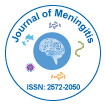Research Article
Polymorphisms in DNA Repair Gene XRCC1 (Arg194Trp) and (Arg399Gln) and their Role in the susceptibility of Bacterial Meningitis
Daniele Maria Lopes Pinheiro1, Fabrícia Lima Fontes1, Ana Helena Sales de Oliveira1, Leonam Gomes Coutinho1, Thayse Azevedo da Silva1, Stephen L. Leib2 and Agnez-Lima LF1*1Departamento de Biologia Celular e Genética, Universidade Federal do Rio Grande do Norte, UFRN, Natal, Brazil
2Institute for Infectious Diseases, University of Bern, Friedbuehlstrasse 51, CH-3010 Bern, Switzerland
- *Corresponding Author:
- Agnez-Lima LF
Laboratório de Biologia Molecular e Genômica
-LBMG, Departamento de Biologia Celular e Genética
Centro de Biociências-UFRN Campus
Universitário, Lagoa Nova Natal - RN, Brazil
Tel: 55 84 32119209
E-mail: lfagnez@gmail.com
Received Date: December 18 , 2015 Accepted Date: January 08, 2016 Published Date: January 28, 2016
Citation: Pinheiro DML,Oliveira HS, Coutinho LG, Silva TA, Leib SL, et al. (2016) Polymorphisms in DNA Repair Gene XRCC1 (Arg194Trp) and (Arg399Gln) and their Role in the susceptibility of Bacterial Meningitis. J Meningitis 1:105. doi: 10.4172/2572-2050.1000105
Copyright: © 2016 Pinheiro DML, et al. This is an open-access article distributed under the terms of the Creative Commons Attribution License, which permits unrestricted use, distribution, and reproduction in any medium, provided the original author and source are credited.
Abstract
Meningitis is a contagious infectious disease with high rates of mortality. Most pathogenic microbes in humans have the ability to cause bacterial meningitis. However, the most common pathogens are Streptococcus pneumoniae, Neisseria meningitidis and Haemophilus influenzae type b (Hib). It was found that the susceptibility to this infectious disease may be related to genetic characteristics of the host, such as the occurrence of single nucleotide polymorphisms (SNPs). In our previous work, association of SNPs in DNA repair genes with bacterial meningitis (BM) was demonstrated. In this study we evaluated two non-synonymous SNPs of the repair gene XRCC1 Arg194Trp (rs 1799782) and Arg399Gln (rs 25487) in patients with BM and health volunteers. The patient genotypes were investigated by PCR-RFLP. DNA damages were quantified using the genomic DNA with formamidopyrimidine DNA-glycosylase (FPG). Cytokines and chemokines were quantified from cerebrospinal fluid samples from BM patients. Concerning the SNP XRCC1 Arg194Trp, none association was found relation to BM. However, a higher frequency of heterozygous genotype for XRCC1 Arg399Gln was observed in the control group compared to the BM group (P=0.043; OR=0.426). DNA damage and cytokine/chemokines levels were not positively correlated with polymorphic genotypes. In conclusion, there is an indication that the SNP XRCC1 Arg399Gln could have a possible protective effect against BM.

 Spanish
Spanish  Chinese
Chinese  Russian
Russian  German
German  French
French  Japanese
Japanese  Portuguese
Portuguese  Hindi
Hindi